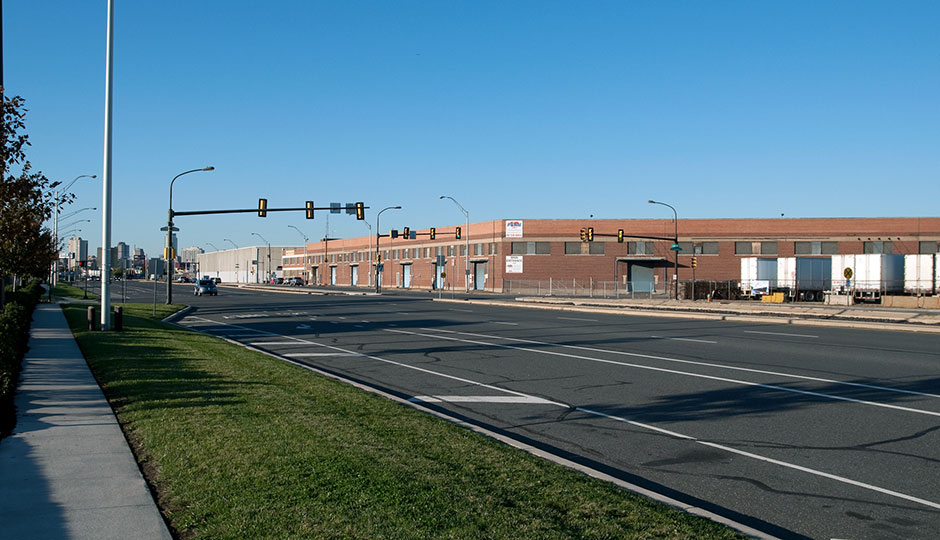Why Is It Delaware “Avenue” but Columbus “Boulevard”?

Is this a boulevard or an avenue? | Photo: Mihai Bojin (license)
One of the more confusing aspects of Philadelphia to newcomers is the name of the street that runs parallel to the Delaware River from the River Wards to South Philadelphia. North of Spring Garden Street, it’s called Delaware Avenue. South of it, it’s called Christopher Columbus Boulevard. Why?
From the city’s founding, Front Street was the original main riverside thoroughfare. Riverfront conditions in early Philadelphia were crude, and Stephen Girard left $500,000 in his will for the construction of Delaware Avenue when he died in 1831.
Per Robert Alotta’s Mermaids, Monasteries, Cherokees and Custer: The Stories Behind Philadelphia Street Names, the first section of Delaware Avenue was completed by 1839. It has been lengthened and widened repeatedly since the early 1870s — a And it’s process that continues today. The street was named after the river, which in turn was named after Thomas West, the third Baron De La Warr — which was also the English name given to the Lenape tribe that originally inhabited the Philadelphia area.
Its renaming stems from a burst of Italian-American pride in the late 1980s and early 1990s. In 1989, then-City Council Majority Leader Anna C. Verna, along with then-Councilman Jimmy Tayoun, introduced a bill that would rechristen the road Columbus Boulevard. Then-U.S. Rep. Thomas M. Foglietta testified in favors of the bill in front of Council.
The plan was immediately met with protest. “I do not think you should take something away from us as we have had so much taken away already,” Toni Sea Flower, a Native American, said when she testified in opposition to the measure. What was supposed to be a simple street renaming — much like when the city renamed West River Drive to Martin Luther King Drive in 2005, Philly was the largest city without a street named for Columbus at the time — turned controversial. The matter was put on hold for a bit, but plans eventually moved forward to rename the street after Columbus in 1992 with a compromise: Only the southern part of the street would be renamed after Columbus.
Protests continued. “You have to understand what an insult it is to the Indian people,” George Hines, an Apache, told the Inquirer at a protest. “It would be like telling the Jewish people that you were going to honor Adolf Hitler.” John Connors, then the head of the Fishtown Civic Association, opposed the change, too: “But even if they named it Richie Ashburn Way, it wouldn’t be right.”
The street was renamed under those protests in 1992, though Columbus signs were regularly defaced for years. (You’ll notice they just say “Columbus Boulevard” now instead of “Christopher Columbus Boulevard.”) It immediately caused confusion, as PennDOT wasn’t sure the name would stick and wouldn’t put up signs for Columbus Boulevard. (The signs are now accurate.) It continues to confuse people today, as many Philadelphians still call the whole thing Delaware Avenue anyway. But why the additional name change from an avenue to a boulevard?
The Philadelphia Streets Department had some answers. Keisha McCarty-Skelton, a spokesperson, said there are no city guidelines for whether streets are streets or roads or lanes or avenues or boulevards or whatever. Developers usually suggest new names for streets, with marketing in mind, and may want to set a house on a “lane” instead of a street.
“A designation such as ‘boulevard’ or ‘avenue’ would seem, by the general understanding of the words, to imply a wider or more heavily traveled road and would be less likely to be used on an ordinary residential street,” McCarty-Skelton says. “Although, again, this is not something that you should expect to see consistently around the City.”
So there’s no rule that made the name change. The same vote from City Council that changed Philadelphia’s riverfront street from Delaware to Columbus also changed it from an avenue into a boulevard. Per the Streets Department, the preamble to the ordinance that changed the street name includes the clause: “Renaming of the avenue a ‘boulevard’ would highlight the growing importance of this rapidly developing waterfront area.” Basically: It was just like a developer branding a street.
The avenue — err, boulevard — did change a bit. The state paid for additional landscaping of the road in the early 1990s, per the Encyclopedia of Greater Philadelphia. Of course, renaming it from an “avenue” to a “boulevard” didn’t really improve Philadelphia’s waterfront much. Just yesterday, the Daily News ran an editorial headlined “City must maintain vision for thriving Delaware waterfront.”
And it’s not even clear that renaming it from an avenue to a boulevard makes people think of it as more of a place to be, either. There are plenty of thriving avenues in the city — Passyunk, Frankford — and anyone who’s driven on it will tell you the most terrifying street in Philadelphia is Roosevelt Boulevard, the 12-lane road that divides the Northeast. Most just call that “The Boulevard.” A 2012 Mental Floss article by Philadelphia freelance writer Matt Soniak defined the terms as such:
An avenue is traditionally a straight road with a line of trees or shrubs running along each side, which emphasize arrival at a landscape or architectural feature.
A boulevard is usually a widened, multi-lane arterial street with a median and landscaping between the curbs and sidewalks on either side.
So… maybe the road along the Delaware is more of a boulevard than an avenue? But it doesn’t seem like the name change is what led to any of the revitalization of Philly’s waterfront. In the past few years, it’s been a series of piers and parks along the river that have brought people there. (Also, on a part of the road that’s still Delaware Avenue, they built a casino.) Whether the street is a boulevard or an avenue, it’s what’s on it that matters.